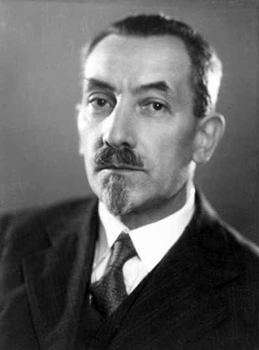Victor Kraft facts for kids
Quick facts for kids
Victor Kraft
|
|
|---|---|
 |
|
| Born | 4 July 1880 |
| Died | 3 January 1975 (aged 94) Purkersdorf, Austria
|
| Nationality | Austrian |
| Education | University of Vienna (PhD) University of Berlin |
| Occupation | Philosopher |
Victor Kraft was an important Austrian thinker. He was born on July 4, 1880, and passed away on January 3, 1975. He was a philosopher, which means he studied big ideas about knowledge and life. He is famous for being part of a group called the Vienna Circle.
Contents
Becoming a Philosopher
Victor Kraft studied at the University of Vienna in Austria. He learned about philosophy, geography, and history. He was very active in the university's philosophy groups. He also joined smaller study groups with other thinkers.
In 1903, he earned his Ph.D. This is a very high university degree. His special paper was about "The Knowledge of the External World." After that, he went to Berlin to continue his studies. He learned from famous professors like Georg Simmel.
In 1912, Kraft started working at the university's library. He was a scientific civil servant there. In 1914, he completed another important academic step. This was called his "habilitation." It allowed him to teach at a university.
Victor Kraft regularly attended meetings of the Vienna Circle. This was a group of philosophers and scientists. They discussed ideas about logic and science. He also had connections with other important thinkers of his time. In 1924, he became an associate professor of theoretical philosophy.
Challenges and Later Career
After 1938, a difficult time began in Austria. Victor Kraft was forced to leave his job at the university library. He also lost his right to teach at the university. This was because of his wife's background.
Even during these hard times, Kraft continued his philosophical research. He worked quietly on his ideas. He was like an "inner emigrant," meaning he stayed in his home country but was cut off from public life.
In 1945, after the difficult period ended, Kraft got his job back. He returned to the university library. In 1947, he became the national librarian. That same year, he was also made an associate professor of philosophy.
Three years later, he became a full professor. He also became a co-director of the philosophy department. He retired from his teaching job in 1952. However, he kept doing research and writing books until he passed away.
The Kraft Circle
Between 1949 and 1953, Victor Kraft led a group of thinkers. This group was named the Kraft Circle after him. During this time, he guided the studies of two students who became very famous. They were Paul Feyerabend and Ingeborg Bachmann.
His Ideas on Philosophy
Victor Kraft had a special way of thinking about philosophy. He was part of the logical positivist movement. But he had his own unique ideas. He believed in a type of empiricism that was not based only on senses. Empiricism is the idea that knowledge comes from experience.
He thought that scientific ideas should be tested using a "hypothetical-deductive" method. This means you make a guess (hypothesis) and then test it to see if it's true. Before World War I, he gave many lectures about scientific philosophy. He continued this work with the Vienna Circle.
Kraft also helped make ethics a science. Ethics is the study of what is right and wrong. He also wrote important works about the philosophy of geography and history.

